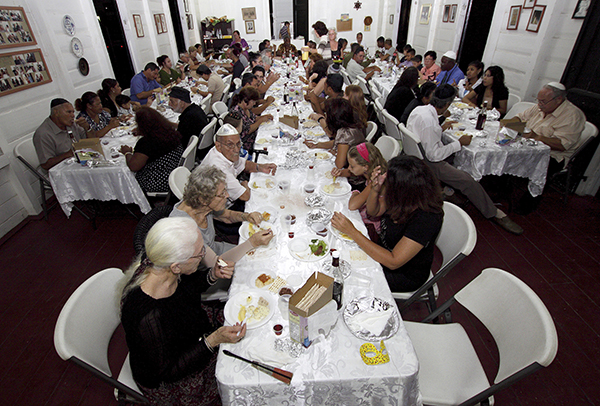This year on Passover, many Jews will have foods on their tables that they never had before.
The Committee on Law and Standards of the Conservative rabbinate –has nullified a custom that forbade Ashkenazic Jews (of central and eastern Europe ancestry) from eating kitniyot (legumes) – rice, beans, corn, and other food stuff.
Sephardic Jews (descendants of Jews from the Iberian peninsula, as well as Jews of Arab lands) have always permitted the eating of legumes.
Why should we get rid of legume-less Passovers?
- The Bible does not mention the prohibition of legumes. It simply says “leaven.”
- Neither does the Talmud.
- The prohibition against legumes seems to have originated in the twelfth century. There are many theories about its origins. Few of those theories seem particularly persuasive.
- The medieval sage and philosopher, Maimonides, thought that it was a “stupid custom.”
- With the re-birth of Jewish nationhood through the State of Israel, Jews should emphasize the unity between them, rather than the ethnic differences that separate them.
- Many Ashkenazic Jews are married to Sephardic Jews. This makes Passover observance a little complicated.
Now, these reasons will not work for every Jew – and, frankly, they shouldn’t.
In fact, some Conservative rabbis have issued a dissenting opinion on the permissibility of eating legumes.
First, the whole “it’s not in the Bible, so I’m not going to do it” argument.
Judaism is not a biblical religion. Here is a list of Jewish customs that do not appear in the Bible: Hanukkah, lighting Shabbat candles, the Passover Seder itself. It’s not only that Judaism is allowed to grow and change; it must.
Second, it is actually quite OK for Ashkenazic Jews to have separate customs from Sephardic Jews. Judaism is a multi-colored prayer shawl. Jewish groups have different customs, different liturgies, and different languages. Jewish diversity is a good thing.
Third, it is true that it no longer makes sense for Jews not to eat legumes, that this custom is obscure and somewhat shaky.
Big deal. Not every custom makes sense.
Consider American customs. The custom of setting off fireworks on the Fourth of July is reminiscent of “the rockets’ red glare” during the war of 1812. We might intellectually reject the bellicosity that is embodied in that memory. But, we ooh and ah fireworks because it is who we are, as Americans.
Fourth, for many Jews, not eating rice, corn products, etc. defines who they are as Jews. Why should we separate Jews from their customs?
Here is the deeper truth.
Many Jews will hear about this new ruling, and, to quote Rhett Butler in Gone With The Wind, they will not give a damn.
First, the Orthodox. They have no reason to loosen the “no legumes” tradition. For some Orthodox Jews, when it comes to such traditions, the stricter the better.
Second, there are the less-involved Jews – the opposite end of the Jewish spectrum. Surveys say that seventy percent of American Jews attend a Passover seder. Every year, publishers come out with new versions of the Passover Haggadah, each one promising to elevate the Seder to new heights of relevance. Someone has to be buying those books.
And yet, despite that seventy percent number, we don’t know what really goes on at Passover seders.
I wonder: do many American Jews simply treat Passover as a Jewish springtime Thanksgiving dinner? Sure, there is matza, and maybe a quick recital of the Four Questions by an available child.
But, in the words of Peggy Lee – is that all there is?
Jewish ideas, ideals, and values do not exist in a vacuum; neither do they free float across the generations. They do not only require intellectual exposition; they need a ritual expression in order for them to become real.
“Remember that you were a stranger, because you were strangers in the land of Egypt.” The notion that all people should be free. The idea that tyrannical regimes, like Egypt, must be dismantled. The idea that Judaism cares most for the vulnerable and the downtrodden. Those are not just words and ideas; they actually do need matzah and bitter herbs and salt water – and the telling of an ancient story – to give them flesh.
I will probably eat rice this Passover. Probably.
As interesting as the legume controversy might be, what we eat is not the biggest issue that we confront this Passover.
It is simply this: What happens when we cease telling our story? What happens to our identity? What happens to who we are? What happens to our ideals and ethics – and not those that can simply be subsumed under the broad and generally unhelpful heading of “being a good person?”
While “you are what you eat” might often be true, it is not always true.
It’s not about what Jews eat.
It’s about what Jews are.






